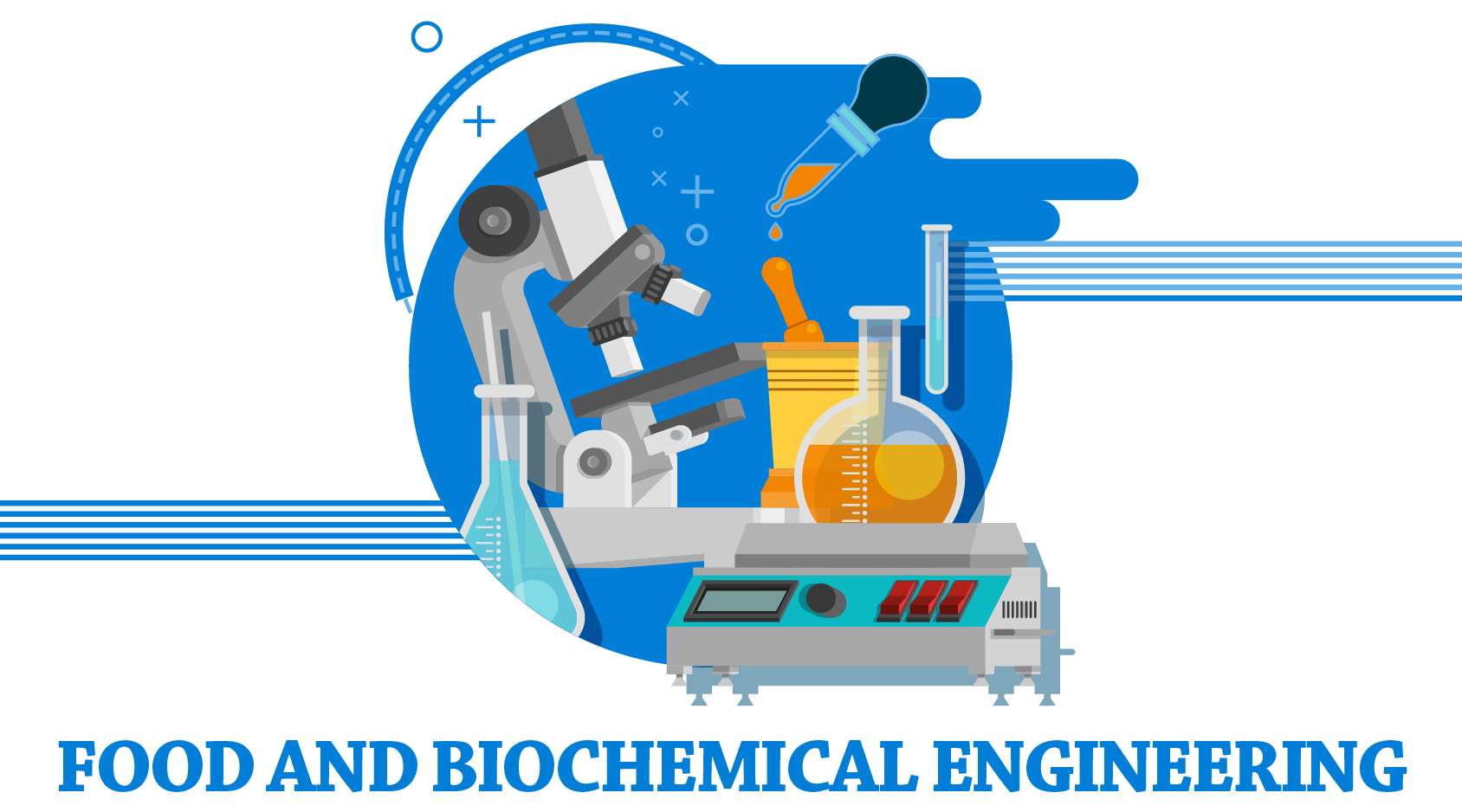Food and Biochemical Engineering is the branch of engineering deals with the processes and technology involved in the production of Food. The aim is to provide modern facilities of freezing, canning, extrusion, fermentative production of enzymes, preservation by fermentation, processing of cereals, chemicals & antibiotics, etc. This course teaches the steps of packaging food after processing ad its preservation through various ways and techniques. It also explores new ways of inventions and discoveries of Food production technologies.

Highlights:
| Course Name | Food and Biochemical Engineering |
|---|---|
| Course Level | B. Tech (Bachelor of Technology), and M.Tech (Master of Technology) |
| Duration |
B.Tech: 4 years M.Tech: 2 years |
| Examination Type | Semester Type |
| Eligibility |
B.Tech: Must have completed 10+2 with a minimum of 50% mark in aggregate M.Tech: B.Tech or Equivalent degree in Engineering |
| Top Recruiters | Amul, Nestle, Cadbury, Britania, etc. |
| Top Career/Job Profiles | Quality Control Officer, Food Scientist, Chemical Engineer, R&D Manager, etc. |
Top Colleges
- Indian Institute of Technology (IIT), Delhi
- Haldia University
- Jadavpur University
- AKS University
- College of Food and Technology, Mumbai
- ICT, Mumbai
- Doon Valley Institute of Engineering and Technology, Haryana
- Amity School of Engineering and Technology
- Education Society’s College of Food and Technology, Maharashtra
- Indian Institute of Food Processing Technology, Thanjavur
Eligibility Criteria:
Candidates need to check their eligibility criteria before applying for any degree in Food and Biochemical Engineering. Candidates need to complete their 10 +2 with a minimum mark of 50% in aggregate. Check the detailed eligibility in the table below:
| Course | Duration | Eligibility | Entrance |
|---|---|---|---|
| B. Tech in Food and Biochemical Engineering | 4 years |
|
JEE Main, WBJEE |
| M.Tech in Food and Biochemical Engineering | 2 years |
|
GATE |
Syllabus:
For B.Tech in Food and Biochemical Engineering:
| Semester I | Semester II |
|---|---|
| Basic mathematics | Physical Chemistry I |
| Introductory Chemistry | Physical Chemistry II |
| Introductory Physics | Basic Electrical Engineering |
| Applied Mechanical Engineering Principle | Basic Microbiology |
| Basic Biochemistry | Biostatistics |
| Communication and presenting Skills | - |
| Semester III | Semester IV |
|---|---|
| Food Chemistry | Food Biotechnology |
| Food Microbiology | Food Additives and Ingredients |
| Principle of Food Preservation | Fruit and Vegetable Processing Technology |
| Introduction to Food Processing | Dairy Technology |
| Principle of Food Science and Engineering | Crop Improvement & Plant Tissue Culture |
| Human Nutrition | - |
| Semester V | Semester VI |
|---|---|
| Meat, Fish, Poultry Processing Technology | Biochemical Engineering Operations |
| Technology for Cereals, Legumes, and Oilseeds | Biochemical Engineering |
| Food Packaging | Human Values and Professional Ethic |
| Sugar and Confectionery Technology | Nutraceuticals and Functional Foods |
| Principles of Food Analysis | Post-Harvest Technology |
| Fermentation Technology | Research Methodology and Scientific Writing |
| Semester VII | Semester VIII |
|---|---|
| Process Design and P&ID | Project work and Internship |
| Waste Management in Food Processing | - |
| Food Process Unit Operation, Engineering, and Design | - |
| Food Safety, Quality, and Regulations | - |
| Good Manufacturing Practices | - |
| Food Business Management & Marketing | - |
For M.Tech in Food and Biochemical Engineering:
| Basic Core Subjects | Interdisciplinary Core Subjects |
|---|---|
| Advanced Mathematics | Environmental Pollution & Management |
| Operation Research | Materials Science |
| Instrumentation & Measurement Techniques | Optimisation Techniques for Engineers |
| Environmental Management & Ecology | Quantitative Methods for Engineers |
| Energy Systems &Management | Advanced Numerical Methods |
| Advanced Fermentation Tech | - |
| Information Systems | - |
| Industrial Pollution & Control | - |
| Safety Engineering | - |
Admission Process:
For B.Tech in Food and Biochemical Engineering:
- Candidates should clear the eligibility criteria
- Most of the colleges offer admission based on scores of entrance exams such as JEE Main, WBJEE.
- Some colleges provide admission directly based on the marks secured in the 10th and 12th.
For M.Tech in Food and Biochemical Engineering:
- The candidate should be eligible for the degree
- Institutions provide admission through valid scores of GATE and other such entrance exams
- Some colleges also offer admission on the basis of marks secured in the undergraduate degree (B.Tech)
Skills Required:
- Need certain skills in problem-solving, information technology skills, and interpreting skills.
- The student who finds the science of Food a fascinating topic
- Must have an understanding of Physics, Chemistry, Biochemistry, and Biotechnology
- Good communication and interpersonal skills
- Should have critical and logic thinking
Top Entrances:
1. JEE Main (Joint Entrance Examination)
- Minimum Qualification: Candidates must have passed 10 and +2 with Physics and Mathematics as compulsory subjects along with Chemistry/Biotechnology/Biology/Technical Vocation subjects
- Exam Duration: 3 Hours
- Exam Mode: Online
- Minimum Qualification: Candidates qualifying the JEE Main are eligible
- Exam Duration: 3 Hours
- Exam Mode: Online
3. WBJEE (West Bengal Joint Entrance Examination)
- Minimum Qualification: Candidates must have passed 10 and +2 with Physics and Mathematics as compulsory subjects along with Chemistry/Biotechnology/Biology/Computer Science /Computer Application
- Exam Duration: 4 Hours
- Exam Mode: Offline
4. GATE (Graduate Aptitude Test in Engineering)
- Minimum Qualification: Candidates should have a Bachelor degree (4 years after 10+2) in Engineering/Technology
- Exam Duration: 3 Hours
- Exam Mode: Online
Career and Job prospects:
After completing your degree in Food and Biochemical Engineering, one can get job opportunities at various Food Industries, Production Management Companies, Research and Development Organizations, etc. Different types of job roles for this course are mentioned in the table below:
| Job Profile | Average Salary Per Annum |
|---|---|
| Quality Control Officer | 5 - 7 Lakh Rupees |
| Food Scientist | 6 - 8 Lakh Rupees |
| Product Development Scientist | 7 - 9 Lakh Rupees |
| Food Dietitian | 3 - 5 Lakh Rupees |
| Quantity Surveyor Officer | 5 - 6 Lakh Rupees |
| Development Chemical Engineer | 5 - 7 Lakh Rupees |
| R&D Manager | 6 - 8 Lakh Rupees |
Employment Areas:
- Food Industries
- Production Management Companies
- Research and Development Organizations
- Chemical Industries
- Ecological and Environmental Agencies
- Health Care Sector
- Waste Treatment Plants
- Water Treatment Plants
- Textile Manufacturing Companies
Top Recruiters:
- Amul
- ITC
- Parle
- Pepsi
- Nestle
- Brittania
- Cadbury
- Dabur
- Godrej
- Hamdard
- Mother Dairy
Top Hiring Cities in India:
- Delhi
- Gurugram
- Kolkata
- Anand
- Pune
- Ghaziabad
- Bengaluru
- Noida
FAQs:
Q: What is Food and Biochemical Engineering?
A: Food and Biochemical Engineering is the branch of engineering deals with the processes and technology involved in the production of Food.
Q: What is the Average salary after graduating in Food and Biochemical Engineering?
A: The average salary will range from 5 - 7 lakh rupees per annum.
Q: What are the employment areas for Food and Biochemical Engineering?
A: The top employment areas are:
- Food Industries
- Production Management Companies
- Research and Development Organizations
- Chemical Industries
- Ecological and Environmental Agencies
- Health Care Sector
Q: What are the top colleges that provide Food and Biochemical Engineering?
A: Top colleges providing Food and Biochemical Engineering are:
- Indian Institute of Technology (IIT), Delhi
- Haldia University
- Jadavpur University
- AKS University
- College of Food and Technology, Mumbai
- Indian Institute of Food Processing Technology, Thanjavur











